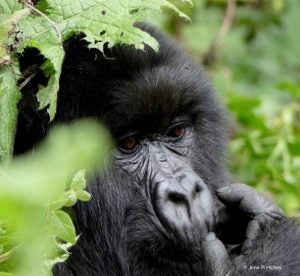
Mountain Gorilla Census Results Announced
New count released from Bwindi-Sarambwe census increases total mountain gorilla numbers
DAVIS, California, December 16, 2019 — JUST ANNOUNCED — On Monday in Kampala, Uganda Wildlife Authority announced the official results of the 2018 Bwindi-Sarambwe mountain gorilla survey. This new minimum count of 459 is an increase from the previous survey estimate in 2011 of 400 mountain gorillas in Bwindi Impenetrable National Park, Uganda and Sarambwe Reserve, DR Congo. When combined with the 2015-2016 population survey results of 604 mountain gorillas in the Virunga Massif, the total world population of endangered mountain gorillas now stands at 1,063.
“That the global population of mountain gorillas continues to grow is a resounding conservation success story that highlights what can be accomplished through strong on-the-ground collaborations,” said Dr. Jena Hickey, Gorilla Ecologist at the UC Davis Mammalian Ecology and Conservation Unit of the Veterinary Genetics Laboratory who served as lead scientist for the recent population surveys of mountain gorillas in both Bwindi-Sarambwe and the Virunga Massif. “And continued collaboration among government, institutional, and NGO partners will be necessary for the foreseeable future as numerous threats to mountain gorillas persist, including risk of infectious diseases, injuries and fatalities from poaching, habitat alteration from an increasing human population, and civil strife in the region.”
“The combination of noninvasive genetic approaches with massive and intensive field surveys in this collaboration of governments, NGOs, and institutional partners was key to determining the otherwise hidden numbers and group size dynamics of unhabituated mountain gorillas, which compose more than half of the population,” said Dr. Ben Sacks, Director of the Mammalian Ecology and Conservation Unit of the UC Davis Veterinary Genetics Laboratory.
The Mammalian Ecology and Conservation Unit’s (MECU) team dedicated to the census included Dr. Elizabeth Kierepka along with Drs. Hickey and Sacks. In collaboration with Gorilla Doctors, a partnership between the Mountain Gorilla Veterinary Project, Inc. and the Karen C. Drayer Wildlife Health Center at the University of California, Davis, Dr. Hickey served as part of the organizing and planning team, adjusted and implemented survey protocols, performed as lead instructor for training the field teams and the co-instructors, managed and analyzed data recorded by field teams, and helped manage the organization and preparation of all fecal samples collected. Once the nearly 2,000 georeferenced fecal samples reached UC Davis, the MECU team isolated DNA and genotyped samples to identify individuals and then combined genetic and geographic data to determine group identities associated with each one. In collaboration with the International Gorilla Conservation Programme, the MECU team coordinated data analysis and writing of the report, which included multiple teleconferences with international partners to ensure accuracy.
The Mammalian Ecology and Conservation Unit of the Veterinary Genetics Laboratory has been involved in developing and instituting several noninvasive genetic population monitoring programs and employs a range of emerging genomic methods to endangered mammal conservation throughout the world.
___________________________________________________________________________________________
Bwindi-Sarambwe Census Partners
The 2018 Bwindi-Sarambwe population surveys of mountain gorillas, known as census, were conducted by the Protected Area Authorities in Uganda and the Democratic Republic of Congo (Uganda Wildlife Authority and l’Institut Congolais pour la Conservation de la Nature) under the transboundary framework of the Greater Virunga Transboundary Collaboration. The census was supported by the Rwanda Development Board, International Gorilla Conservation Programme (a coalition of Conservation International, Fauna & Flora International and WWF), Mammalian Ecology and Conservation Unit (MECU) of the UC Davis Veterinary Genetics Laboratory, Max Planck Institute for Evolutionary Anthropology, The Dian Fossey Gorilla Fund, Institute of Tropical Forest Conservation, Gorilla Doctors, Conservation Through Public Health, Wildlife Conservation Society Uganda Country Office, WWF Uganda Country Office, and Bwindi Mgahinga Conservation Trust. The census was funded by Fauna & Flora International, WWF, and Partners in Conservation at the Columbus Zoo & Aquarium.
___________________________________________________________________________________________
About Mammalian Ecology and Conservation Unit
The mission of the Mammalian Ecology and Conservation Unit (MECU) is to conduct research that advances both the persistence of wild mammal biodiversity and a basic understanding of mammal evolution and ecology. In this context, the MECU is an educational entity, providing opportunities for graduate and undergraduate students, as well as post-doctoral and visiting researchers. The MECU collaborates internationally and locally with other academic investigators and works closely with state, federal, and local agencies to ensure that their research has practical application.
___________________________________________________________________________________________
Partner Links
Uganda Wildlife Authority – https://www.ugandawildlife.org/news-events/news
International Gorilla Conservation Programme (IGCP) – http://igcp.org/blog/
UC Davis One Health Institute – https://ohi.vetmed.ucdavis.edu/
Veterinary Genetics Laboratory – https://www.vgl.ucdavis.edu/
Gorilla Doctors – www.gorilladoctors.org
___________________________________________________________________________________________
Media contact: Ben Sacks, bnsacks@ucdavis.edu
Twitter: @theMECU
